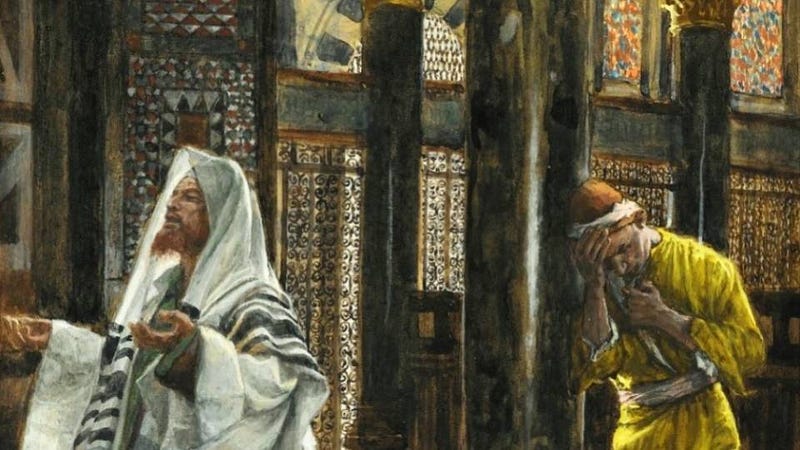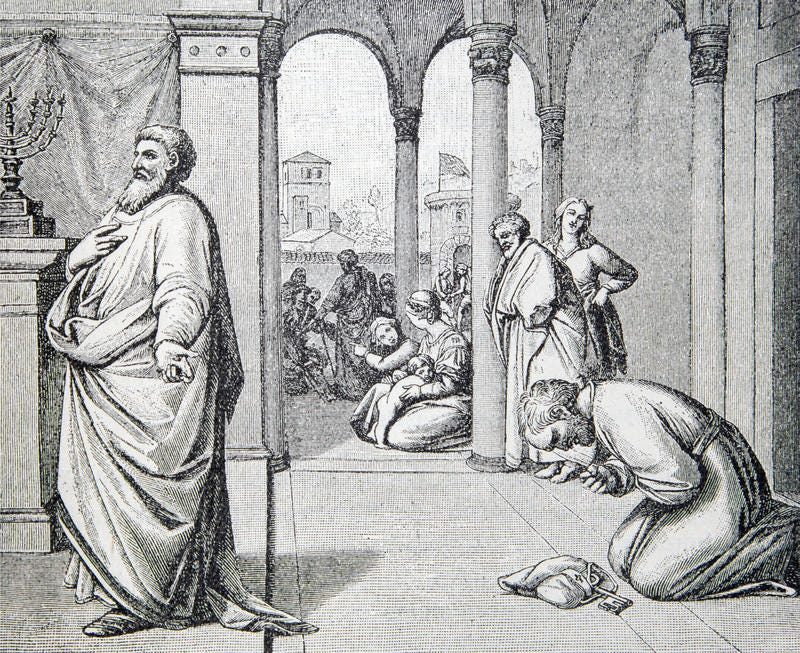# The Power of Humility: Lessons from the Pharisee and the Tax Collector
Written on
Chapter 1: The Two Contrasting Figures
In this thought-provoking narrative, we encounter a striking contrast between two individuals. The first is a Pharisee, a man of notable status in his community, who prides himself on strictly adhering to the Mosaic Law and the complex Jewish rituals. He holds himself in high esteem, viewing others as “unclean” and unworthy of his company.
On the opposite end, we have the tax collector, often regarded with disdain by his peers. Seen as dishonest and corrupt, he bears the weight of societal contempt, yet he approaches God with a heart full of humility.
> "Guard your steps when you go to the house of God. To draw near to listen is better than to offer the sacrifice of fools, for they do not know that they are doing evil." — Ecclesiastes 5:1
The two men arrive at the temple with the shared purpose of prayer, yet their motivations and attitudes couldn't be more different.
Section 1.1: The Pharisee's Self-Importance
The Pharisee's prayer serves as a self-congratulatory affirmation of his perceived virtues. He expresses gratitude for not being like "other men," reveling in his own righteousness.
Subsection 1.1.1: The Tax Collector's Plea for Mercy

In stark contrast, the tax collector stands at a distance, refusing to even glance upward. He beats his chest and pleads, "God, be merciful to me, a sinner!" His humble acknowledgment of his shortcomings is what ultimately leads to his justification.
Section 1.2: The Essence of True Prayer
The core lesson of this parable emphasizes the importance of approaching God with the right heart. Effective prayers are rooted in faith and gratitude, recognizing God’s love and mercy.
"And this is the confidence that we have toward Him, that if we ask anything according to His will He hears us." — 1 John 5:14-15
We are reminded to adopt the humble spirit of the tax collector, rather than the self-important attitude of the Pharisee.
Chapter 2: Consequences of Attitude
The Pharisee faces grave consequences for his pride. By choosing self-importance over God’s righteousness, he stands condemned. Many may view this punishment as severe, but it reflects God's uncompromising standards of holiness.
On the other hand, the tax collector's humility and repentance lead him to receive God’s grace. He is justified and made righteous, despite the scorn he faces from others.

Section 2.1: The Timeless Relevance of Jesus' Teachings
Jesus' parables, although shared centuries ago, remain profoundly relevant today. They offer wisdom that resonates with our lives, urging us to reflect on our own attitudes and beliefs.
"Humble yourselves, therefore, under the mighty hand of God so that at the proper time He may exalt you." — 1 Peter 5:6
This particular story serves as a powerful reminder of the disparity between outward appearances and genuine faith. It calls out self-righteousness and encourages us to seek God's grace.
Section 2.2: The Importance of Genuine Prayer
During moments of fatigue, prayers can become routine and lacking in sincerity. However, true connection with God requires us to focus our hearts and seek His forgiveness genuinely.
Jesus desires earnest prayers from us—those grounded in love and faith. It is not merely the words we utter but the intention behind them that matters.
Ultimately, this parable illustrates God’s justifying grace—a transformative gift that changes a repentant sinner into a beloved child of God.
"Therefore, since we have been justified by faith, we have peace with God through our Lord Jesus Christ." — Romans 5:1
In conclusion, approaching God with a humble heart and acknowledging our need for His grace is the pathway to true righteousness.
Feel free to share your thoughts and insights on this uplifting story, and don't hesitate to follow for more inspiring content! Thank you!